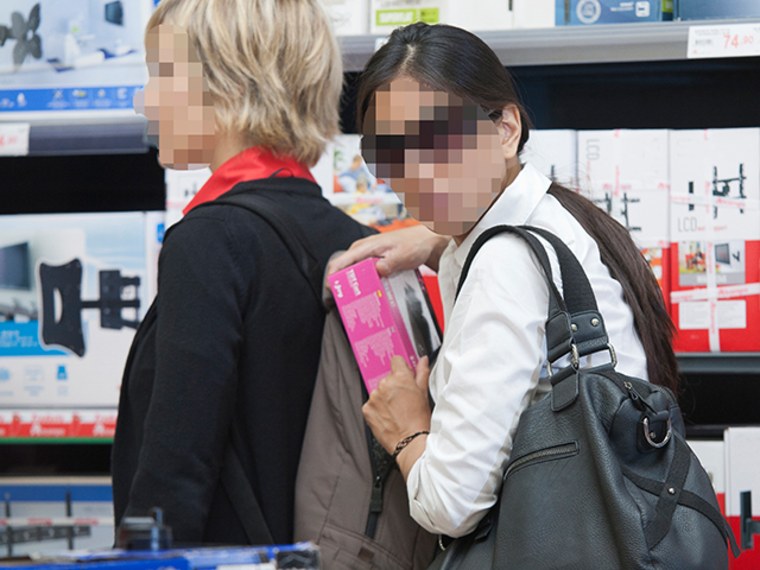Everyone needs a little boost to beat the holiday blues. For some during a down economy, it's shoplifting.
Retailers call it "shrinkage," the loss of inventory from the store shelves or storage from sticky-fingered shoppers and employees. The total cost to retailers last year was $112 billion, including losses from employee and supplier fraud, and organized retail crime gangs, according to the 2012-2013 Global Retail Theft Barometer.
And it goes up during the holidays, but not because thieves are trying to make Santa's bag bigger. Experts say that most thieves are in it for themselves.
The thought going through a shoplifter's head is simple: "This is the time of year when we gift others, so we should gift ourselves as well," said Robert McCrie, a professor of security management. "People tend to shoplift for themselves, not to find gifts for other people."
According to an analysis of the most recently available FBI data, conducted by the John Jay College of Criminal Justice on behalf of NBC News, national shoplifting arrests averaged 80,889 during November and December 2011, an 8.95 percent increase over the prior two months, and higher than the non-seasonal average of 71,073 offenses.
"Within a general trend of annual increases in shoplifting arrests, the FBI data show that the total arrests in November and December in 2011 were up 9 to 14 percent, nationally and regionally," said Margaret Smith, a research associate at the Institute for Criminal Justice Ethics at the John Jay College of Criminal Justice. "The difference in the holiday-months increases in the number of arrests is statistically significant, when compared with the monthly average for all of 2011."
Previous years saw increases in shoplifting offenses during the holidays as well, with a 5.27 percent increase during the same period in 2009 and a 7.25 percent increase in 2007. Actual numbers are likely higher, as retailers during the busy holiday shopping season might choose to simply photograph shoplifters, take the merchandise back, and let them go, said Smith.
And as the economy weakened, shoplifting increased. From 2005 to 2012, annual shoplifting offenses rose from 698,233 to 997,739, according to the FBI, a nearly 43 percent increase.
Experts say that most shoplifters know what they're doing isn't right, but are compelled to steal anyway.
"The vast majority of people who shoplift do it out of personal issues," said Barbara Staib of the National Association for Shoplifting Prevention, or NASP. "Maybe a distorted sense of entitlement... they see an opportunity, they find a convenient excuse."
That excuse can be anything from the senior citizen who feels being a regular customer justifies her palming a bottle of Tylenol to supplement her $50 per week grocery budget, to a small business owner who feels everyone takes from him in his life, so what if he takes a little something for himself?
This season, with its focus on selfless giving, can exacerbate tensions for those who feel like they're already getting the short end of the stick.
But while getting over on a perceived injustice might be what tempts a first-time shoplifter, it's the high stealing gives them that keeps them coming back, experts say. The ride of fear and, if they don't get caught, victory, can trigger a dopamine rush that fills a void in their brain's chemistry.
It becomes a button they want to hit again and again.
"Many become addicted to shoplifting like a drug," said Terrence Shulman, founder of The Shulman Center for Compulsive Theft, Spending and Hoarding.
Alfred K., a 38-year-old dentist from Pennsylvania, who asked that his last name be withheld, says he wishes he had been addicted to something else, like alcohol or sex. "At least it would make sense," he said.
The dentist, who says he no longer shoplifts, said he got started six years ago. While returning a pack of the wrong kind of nails to Home Depot, he first got a new pack from the shelf. The return clerk scanned and gave him credit for both. He let her make the mistake, he said.
"It was kind of exciting for me, I was kind of getting free money for nothing," said Alfred K. Noticing a crack in the system, he returned week after week to leverage it. He started off small, just a few bucks here and there, then graduated to bigger items. Eventually, he said, "I just started walking out the store with things."
He also expanded to other stores. One of his arrests was at Best Buy after he placed a serial number sticker from an old Wii on a new one and tried to return it for $249. A misdemeanor charge led to his dentist license being put on probation. He lost his job. All told, he estimates his compulsion cost him over $100,000 in attorney fees and lost income.
Growing up, he said, his Syrian immigrant parents didn't have much. His dad, ex-military, let the kids have one toy a year. "One time it was a girl's toy. I remember getting a pink car." And you had to be thankful for it, he said.
Now, he said, "My 6-year-old is asking for an iPad for Christmas."
The holidays are especially tough times for shoplifters, said Alfred K.
"We spend so much on the holidays that I'm looking for ways to save. What's the easiest way to save but to steal? Sounds stupid, but that's how I justified it," he said.
It's not that shoplifters don't believe it's better to give than to receive. It's just that they feel like they're never on the receiving end, so they make sure they take care of themselves too.
"They have to convince themselves that something they know is wrong is OK," said NASP's Staib. "The more people are anxious about money," such as during the holidays and the recession, "the more likely they are to rationalize it. But economics is not an excuse."
Contact Ben Popken via ben.popken@nbcuni.com, @bpopken or benpopkenwrites.com.
